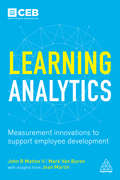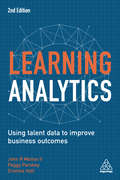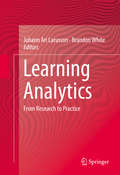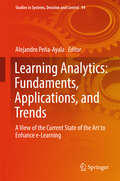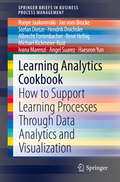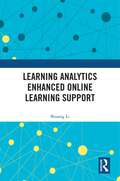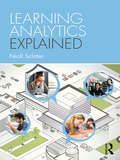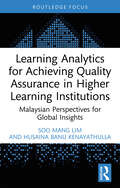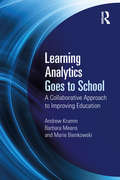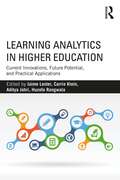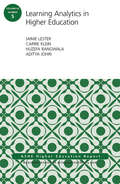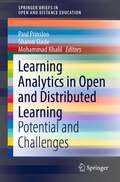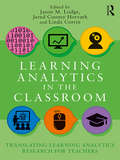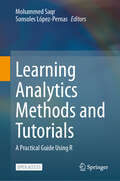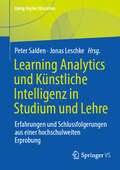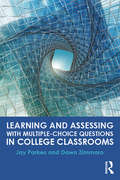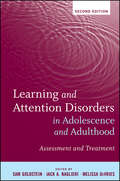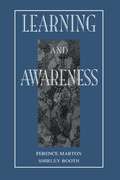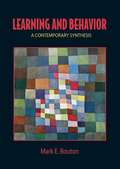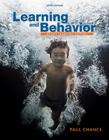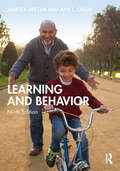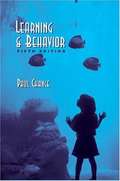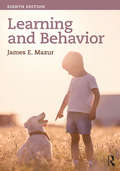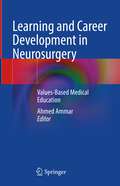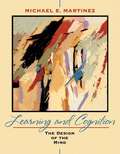- Table View
- List View
Learning Analytics: Measurement Innovations to Support Employee Development
by Mark Van Buren Jean Martin John MattoxFaced with organizations that are more dispersed, a workforce that is more diverse and the pressure to reduce costs, CEOs and CFOs are increasingly asking what the return on investment is from training and development programmes. Learning Analytics provides a framework for understanding how to work with learning analytics at an advanced level. It focuses on the questions that training evaluation is intended to answer: is training effective and how can it be improved? It discusses the field of learning analytics, outlining how and why analytics can be useful, and takes the reader through examples of approaches to answering these questions and looks at the valuable role that technology has to play. Even where technological solutions are employed, the HR or learning and development practitioner needs to understand what questions they should be asking of their data to ensure alignment between training and business needs.Learning Analytics enables both senior L&D and HR professionals as well as CEOs and CFOs to see the transformational power that effective analytics has for building a learning organization, and the impacts that this has on performance, talent management, and competitive advantage. It helps learning and development professionals to make the business case for their activities, demonstrating what is truly adding value and where budgets should be spent, and to deliver a credible service to their business by providing metrics based on which sound business decisions can be made.
Learning Analytics: Using Talent Data to Improve Business Outcomes
by Cristina Hall John R Mattox II Peggy ParskeyEffective evaluation and measurement of learning and development initiatives is critical to maximise the impact of training, identify gaps for improvement and ensure that efforts are aligned to the business' needs. Learning Analytics outlines how analytical approaches can respond to these challenges, the types and benefits of technological solutions and how to ask the right questions of organizational data in order to build a learning organization that boosts performance and competitive advantage.Drawing upon case studies from organizations who have applied such approaches such as The Gap, Hilton Worldwide University and Seagate Technology, Learning Analytics will enable those involved in learning and development to make the business case for their activities and deliver an evidence-based service to their organizations. Alongside updated chapters on learning technology tools and moving beyond learning analytics to talent management analytics, this second edition also features new content on measuring informal learning, increasing data literacy, and framing L&D's contributions through a portfolio evaluation approach.
Learning Analytics
by Johann Ari Larusson Brandon WhiteIn education today, technology alone doesn't always lead to immediate success for students or institutions. In order to gauge the efficacy of educational technology, we need ways to measure the efficacy of educational practices in their own right. Through a better understanding of how learning takes place, we may work toward establishing best practices for students, educators, and institutions. These goals can be accomplished with learning analytics. Learning Analytics: From Research to Practice updates this emerging field with the latest in theories, findings, strategies, and tools from across education and technological disciplines. Guiding readers through preparation, design, and examples of implementation, this pioneering reference clarifies LA methods as not mere data collection but sophisticated, systems-based analysis with practical applicability inside the classroom and in the larger world. Case studies illustrate applications of LA throughout academic settings (e. g. , intervention, advisement, technology design), and their resulting impact on pedagogy and learning. The goal is to bring greater efficiency and deeper engagement to individual students, learning communities, and educators, as chapters show diverse uses of learning analytics to: Enhance student and faculty performance. Improve student understanding of course material. Assess and attend to the needs of struggling learners. Improve accuracy in grading. Allow instructors to assess and develop their own strengths. Encourage more efficient use of resources at the institutional level. Researchers and practitioners in educational technology, IT, and the learning sciences will hail the information in Learning Analytics: From Research to Practice as a springboard to new levels of student, instructor, and institutional success.
Learning Analytics: Fundaments, Applications, and Trends
by Alejandro Peña-AyalaThis book provides a conceptual and empirical perspective on learning analytics, its goal being to disseminate the core concepts, research, and outcomes of this emergent field. Divided into nine chapters, it offers reviews oriented on selected topics, recent advances, and innovative applications. It presents the broad learning analytics landscape and in-depth studies on higher education, adaptive assessment, teaching and learning. In addition, it discusses valuable approaches to coping with personalization and huge data, as well as conceptual topics and specialized applications that have shaped the current state of the art. By identifying fundamentals, highlighting applications, and pointing out current trends, the book offers an essential overview of learning analytics to enhance learning achievement in diverse educational settings. As such, it represents a valuable resource for researchers, practitioners, and students interested in updating their knowledge and finding inspirations for their future work.
Learning Analytics Cookbook: How to Support Learning Processes Through Data Analytics and Visualization (SpringerBriefs in Business Process Management)
by Roope Jaakonmäki Stefan Dietze Hendrik Drachsler Albrecht Fortenbacher René Helbig Michael Kickmeier-Rust Ivana Marenzi Angel Suarez Haeseon Yun Jan vom BrockeThis book offers an introduction and hands-on examples that demonstrate how Learning Analytics (LA) can be used to enhance digital learning, teaching and training at various levels. While the majority of existing literature on the subject focuses on its application at large corporations, this book develops and showcases approaches that bring LA closer to smaller organizations, and to educational institutions that lack sufficient resources to implement a full-fledged LA infrastructure. In closing, the book introduces a set of software tools for data analytics and visualization, and explains how they can be employed in several LA scenarios.
Learning Analytics Enhanced Online Learning Support
by Shuang LiOffering the latest developments in online education in the era of big data, this book explores theories, technologies, and practices in the field of data-driven online learning support services using learning analytics. This book is divided into five chapters. Chapter 1 reflects and reconstructs the connotation of learning support against the backdrop of education reform, the rise of learning analytics, and the upgrading of the demand for learning services in the new era. Chapter 2 presents a P-K-DSE-E model of online learner characteristics and discusses measurement and data representation methods for learner characteristics based on it. Chapters 3–5 focus on the three types of learning support that are closely related to learning performance and satisfaction, including the promotion of social learning, electronic learning assessment based on the learning process, and personalized tutoring and support. This book innovatively develops the concept, theory, and practical methods of student support services in distance education traditional practices in the new era and provides valuable exploration of data-driven personalized learning service methods and technologies in the era of artificial intelligence through rich examples. This book will be essential reading for students and scholars of distance and online education, educational technology, and audiovisual education.
Learning Analytics Explained
by Niall SclaterLearning Analytics Explained draws extensively from case studies and interviews with experts in order to discuss emerging applications of the new field of learning analytics. Educational institutions increasingly collect data on students and their learning experiences, a practice that helps enhance courses, identify learners who require support, and provide a more personalized learning experience. There is, however, a corresponding need for guidance on how to carry out institutional projects, intervene effectively with students, and assess legal and ethical issues. This book provides that guidance while also covering the evolving technical architectures, standards, and products within the field.
Learning Analytics for Achieving Quality Assurance in Higher Learning Institutions: Malaysian Perspectives for Global Insights (Routledge Research in Higher Education)
by Soo Mang Lim Husaina Banu KenayathullaThis book explores Learning Analytics (LA) programmes and practices in Malaysia as well as looking at the underlying forces, dilemmas and policy challenges for quality assurance in higher education institutions (HEIs). This chapters provide a comprehensive discussion of trends in academic quality assurance in higher education. It articulates a combination of theoretical issues and empirical analysis and offers a comprehensive guide to stakeholders in Management and Faculty on LA implementation in HEIs where the model in this book can be used to pave the way for a successful LA initiative. Learning Analytics is an emerging multidisciplinary technological practice with the ultimate goal of producing effective learning to improve students’ achievement in the tertiary level. The Learning Analytics model of Quality Assurance in this book is an essential guide for any faculty or manager in higher education, or researchers in higher education and learning analytics.
Learning Analytics Goes to School: A Collaborative Approach to Improving Education
by Andrew Krumm Barbara Means Marie BienkowskiLearning Analytics Goes to School presents a framework for engaging in education research and improving education practice through the use of newly available data sources and analytical approaches. The application of data-intensive research techniques to understanding and improving learning environments has been growing at a rapid pace. In this book, three leading researchers convey lessons from their own experiences—and the current state of the art in educational data mining and learning analytics more generally—by providing an explicit set of tools and processes for engaging in collaborative data-intensive improvement.
Learning Analytics in Higher Education: Current Innovations, Future Potential, and Practical Applications
by Jaime Lester Carrie Klein Aditya Johri Huzefa RangwalaLearning Analytics in Higher Education provides a foundational understanding of how learning analytics is defined, what barriers and opportunities exist, and how it can be used to improve practice, including strategic planning, course development, teaching pedagogy, and student assessment. Well-known contributors provide empirical, theoretical, and practical perspectives on the current use and future potential of learning analytics for student learning and data-driven decision-making, ways to effectively evaluate and research learning analytics, integration of learning analytics into practice, organizational barriers and opportunities for harnessing Big Data to create and support use of these tools, and ethical considerations related to privacy and consent. Designed to give readers a practical and theoretical foundation in learning analytics and how data can support student success in higher education, this book is a valuable resource for scholars and administrators.
Learning Analytics in Higher Education: ASHE Higher Education Report (J-B ASHE Higher Education Report Series (AEHE))
by Jaime Lester Carrie Klein Huzefa Rangwala Aditya JohriLearning analytics (or educational big data) tools are increasingly being deployed on campuses to improve student performance, retention and completion, especially when those metrics are tied to funding. Providing personalized, real-time, actionable feedback through mining and analysis of large data sets, learning analytics can illuminate trends and predict future outcomes. While promising, there is limited and mixed empirical evidence related to its efficacy to improve student retention and completion. Further, learning analytics tools are used by a variety of people on campus, and as such, its use in practice may not align with institutional intent. This monograph delves into the research, literature, and issues associated with learning analytics implementation, adoption, and use by individuals within higher education institutions. With it, readers will gain a greater understanding of the potential and challenges related to implementing, adopting, and integrating these systems on their campuses and within their classrooms and advising sessions. This is the fifth issue of the 43rd volume of the Jossey-Bass series ASHE Higher Education Report. Each monograph is the definitive analysis of a tough higher education issue, based on thorough research of pertinent literature and institutional experiences. Topics are identified by a national survey. Noted practitioners and scholars are then commissioned to write the reports, with experts providing critical reviews of each manuscript before publication.
Learning Analytics in Open and Distributed Learning: Potential and Challenges (SpringerBriefs in Education)
by Paul Prinsloo Sharon Slade Mohammad KhalilThis book explores and further expands on the rich history of theoretical and empirical research in open and distributed learning, and addresses the impact of the “data revolution” and the emergence of learning analytics on this increasingly diverse form of educational delivery. Following an introductory chapter that maps the book’s conceptual rationale, the book discusses the potential, challenges and practices of learning analytics in various open and distributed contexts. A concluding chapter briefly summarises the chapters before providing a tentative future research agenda for learning analytics in open and distributed environments.
Learning Analytics in the Classroom: Translating Learning Analytics Research for Teachers
by Jason M. Lodge Jared Cooney Horvath Linda CorrinLearning Analytics in the Classroom presents a coherent framework for the effective translation of learning analytics research for educational practice to its practical application in different education domains. Highlighting the real potential of learning analytics as a way to better understand and enhance student learning and with each chapter including specific discussion about what the research means in the classroom, this book provides educators and researchers alike with the tools and frameworks to effectively make sense of and use data and analytics in their everyday practice. This volume is split into five sections, all of which relate to the key themes in understanding learning analytics through the lens of the classroom: broad theoretical perspectives understanding learning through analytics the relationship between learning design and learning analytics analytics in the classroom and the impact it can and will have on education implementing analytics and the challenges involved. Bridging the gap between research, theory and practice, Learning Analytics in the Classroom is both a practical tool and an instructive guide for educators, and a valuable addition to researchers' bookshelves. A team of world-leading researchers and expert editors have compiled a state-of-the-art compendium on this fascinating subject and this will be a critical resource for the evolution of this field into the future.
Learning Analytics Methods and Tutorials: A Practical Guide Using R
by Sonsoles López-Pernas Mohammed SaqrThis open access comprehensive methodological book offers a much-needed answer to the lack of resources and methodological guidance in learning analytics, which has been a problem ever since the field started. The book covers all important quantitative topics in education at large as well as the latest in learning analytics and education data mining. The book also goes deeper into advanced methods that are at the forefront of novel methodological innovations. Authors of the book include world-renowned learning analytics researchers, R package developers, and methodological experts from diverse fields offering an unprecedented interdisciplinary reference on novel topics that is hard to find elsewhere.The book starts with the basics of R as a programming language, the basics of data cleaning, data manipulation, statistics, and analytics. In doing so, the book is suitable for newcomers as they can find an easy entry to the field, as well as being comprehensive of all the major methodologies. For every method, the corresponding chapter starts with the basics, explains the main concepts, and reviews examples from the literature. Every chapter has a detailed explanation of the essential techniques and basic functions combined with code and a full tutorial of the analysis with open-access real-life data. A total of 22 chapters are included in the book covering a wide range of methods such as predictive learning analytics, network analysis, temporal networks, epistemic networks, sequence analysis, process mining, factor analysis, structural topic modeling, clustering, longitudinal analysis, and Markov models. What is really unique about the book is that researchers can perform the most advanced analysis with the included code using the step-by-step tutorial and the included data without the need for any extra resources.This is an open access book.
Learning Analytics und Künstliche Intelligenz in Studium und Lehre: Erfahrungen und Schlussfolgerungen aus einer hochschulweiten Erprobung (Doing Higher Education)
by Peter Salden Jonas LeschkeIn dem Sammelband werden die Ergebnisse aus dem Projekt „KI:edu.nrw - Didaktik, Ethik und Technik von Learning Analytics und KI in der Hochschulbildung“ im Zeitraum 2020-2023 vorgestellt. Ziel des Projekts war es, sowohl an der im Schwerpunkt geförderten Ruhr-Universität Bochum als auch an der partnerschaftlich verbundenen RWTH Aachen exemplarisch zu erarbeiten, wie Regeln, Konzepte, Prozesse und Technik für den Einsatz von Learning Analytics und KI in Studium und Lehre ausgestaltet werden können. Die Besonderheit: Alle lehrbezogenen Akteurinnen und Akteure wurden in einem umfassenden Ansatz einbezogen, um zu verstehen, wie Hochschulen sich als Gesamtorganisationen auf die kommenden Herausforderungen in diesem Bereich einstellen müssen. Der Band zeigt damit Wege in eine zukünftige Hochschulwelt, die nicht mehr in allzu weiter Ferne liegt.
Learning and Assessing with Multiple-Choice Questions in College Classrooms
by Jay Parkes Dawn ZimmaroMultiple-choice questions (MCQs) are a ubiquitous tool used in college classrooms, yet most instructors admit that they are not prepared to maximize the question's benefits. Learning and Assessing with Multiple-Choice Questions in College Classrooms is a comprehensive resource designed to enable instructors and their students to enhance student learning through the use of MCQs. Including chapters on writing questions, assessment, leveraging technology, and much more, this book will help instructors increase the benefits of a question type that is incredibly useful as both a learning and assessment tool in an education system seeking ways to improve student outcomes. .
Learning and Attention Disorders in Adolescence and Adulthood
by Sam Goldstein Jack A. Naglieri Melissa DevriesFully revised coverage with the most current diagnoses and treatments for adolescents and adults living with learning and attention disordersReflecting the most recent and relevant findings regarding Learning Disabilities (LD) and Attention-Deficit/Hyperactivity Disorder (ADHD), this Second Edition of Learning and Attention Disorders in Adolescence and Adulthood provides practitioners in the fields of education and mental health with a set of practical guidelines to assist in the assessment, diagnosis, consultation, and treatment of adolescents and adults struggling with LD and ADHD. The new edition includes: An emphasis on working from strengths-adapting to disabilities and dealing with them successfully on a daily basis New coverage of the causes and long-term implications of LD and ADHD in adolescents and adulthood New chapters on treatment effectiveness; building resiliency and shaping mindsets; cognitive therapy; and strategic life coaching to help guide individuals with LD and ADHD Contributions from leading researchers, including Noel Gregg, Russell Barkley, Kevin Antshel, and Nancy MatherDrawing on evidence-based techniques to meet the pragmatic demands for intervention, the Second Edition guides school psychologists, counselors, and educators in promoting positive change for adolescents and adults with LD and ADHD as they strive for success in school, work, and home settings.
Learning and Awareness (Educational Psychology Series)
by Ference Marton Shirley BoothThis book stems from more than 25 years of systematic research into the experience of learning undertaken by a research team trying to account for the obvious differences between more or less successful instances of learning in educational institutions. The book offers an answer in terms of the discovery of critical differences in the structure of the learner's awareness and critical differences in the meaning of the learner's world. The authors offer a detailed account of the empirical findings that give rise to theoretical insights, and discuss the particular form of qualitative research that has been employed and developed. The form of learning that is the object of study is considered to be the most fundamental form -- namely a change in the learner's way of seeing, experiencing, handling, and understanding aspects of the world. The need for rigorous analysis of learning of specific subject matter, the individual construction of knowledge, and its social and cultural embeddedness -- the defining features of rival approaches into research on learning -- are reconciled from the approach adopted here into an intertwined and whole experience of learning. The learner's experience is always one of learning something, in some way, and in some context; by holding the learner's experience of learning as the focus of study throughout -- and not studying the learning of the content and the acts and the context as separate and distinct focuses -- the content, the act, and the context remain united as constituents of the learner's experience. By empirically revealing critical differences in the ways of experiencing these aspects of learning, and by developing a theoretical framework for the dynamics through which change comes about in the learner's awareness, this book gradually leads the reader to a powerful new view of learning. Equipped with the analytical tools and conceptual apparatus to be found in this book, the reader will be empowered to learn and to assist others to learn by creating environments conducive to the most fundamental form of learning: experiencing aspects of the world in new ways.
Learning And Behavior: A Contemporary Synthesis
by Mark E. BoutonProviding a strong background in modern learning and behavior theory, this book reflects the importance of the study of animal learning in psychology. Topics covered include learning and adaptation, modern conditioning theories, memory retrieval, instrumental learning, avoidance learning and learned helplessness.
Learning and Behavior: Active Learning Edition (6th edition)
by Paul ChanceThis undergraduate textbook introduces the natural science approach to behavior and describes the efforts of researchers to understand the kinds of experiences that produce learning, the circumstances under which learning in one situation carries over to another situation, the effects of different reinforcement schedules, the durability of learned behavior, and the limitations of learning.
Learning and Behavior
by James E. Mazur Amy L. OdumLearning and Behavior reviews how people and animals learn and how their behaviors are changed because of learning. It describes the most important principles, theories, controversies, and experiments that pertain to learning and behavior that are applicable to diverse species and different learning situations. Both classic studies and recent trends and developments are explored, providing a comprehensive survey of the field. Although the behavioral approach is emphasized, many cognitive theories are covered as well, along with a chapter on comparative cognition. Real-world examples and analogies make the concepts and theories more concrete and relevant to students. In addition, most chapters provide examples of how the principles covered have been employed in applied and clinical behavior analysis. The text proceeds from the simple to the complex. The initial chapters introduce the behavioral, cognitive, and neurophysiological approaches to learning. Later chapters give extensive coverage of classical conditioning and operant conditioning, beginning with basic concepts and findings and moving to theoretical questions and current issues. Other chapters examine the topics of reinforcement schedules, avoidance and punishment, stimulus control and concept learning, observational learning and motor skills, comparative cognition, and choice. Thoroughly updated, each chapter features many new studies and references that reflect recent developments in the field. Learning objectives, bold-faced key terms, practice quizzes, a chapter summary, review questions, and a glossary are included. The text is intended for undergraduate or graduate courses in psychology of learning, (human) learning, introduction to learning, learning processes, animal behavior, (principles of) learning and behavior, conditioning and learning, learning and motivation, experimental analysis of behavior, behaviorism, and behavior analysis.
Learning and Behavior (5th edition)
by Paul ChancePer the author: The theme of this edition is that learning is a biological mechanism that aids survival. My goal was to write a text that would cover the course contents in the theory and research of behavior and learning. This book is an instructional tool, not a reference book.
Learning and Behavior (8th Edition): Eighth Edition
by James E. Mazur<p>This book reviews how people and animals learn and how their behaviors are changed as a result of learning. It describes the most important principles, theories, controversies, and experiments that pertain to learning and behavior that are applicable to diverse species and different learning situations. Both classic studies and recent trends and developments are explored, providing a comprehensive survey of the field. <p>Although the behavioral approach is emphasized, many cognitive theories are covered as well, along with a chapter on comparative cognition. Real-world examples and analogies make the concepts and theories more concrete and relevant to students. In addition, most chapters provide examples of how the principles covered have been applied in behavior modification and therapy. <p>Thoroughly updated, each chapter features many new studies and references that reflect recent developments in the field. Learning objectives, bold-faced key terms, practice quizzes, a chapter summary, review questions, and a glossary are included. <p>The volume is intended for undergraduate or graduate courses in psychology of learning, (human) learning, introduction to learning, learning processes, animal behavior, (principles of) learning and behavior, conditioning and learning, learning and motivation, experimental analysis of behavior, behaviorism, and behavior analysis.</p>
Learning and Career Development in Neurosurgery: Values-Based Medical Education
by Ahmed AmmarThe neurosurgical, surgical and medical training and practice models have to keep up with the technological revolution in the 21st Century as our lives changed on a swift base. Making bioethics and metacognition a cornerstone in medical education and practice will flourish our humane societies. Metacognition is thinking about one’s thinking, to plan, monitor and assess one’s understanding and performance. By adherence to medical ethics and Values-Based Medicine (VsBM) as guiding principles, we can develop benevolent medical practice. To enhance knowledge application, skills, and character qualities in realms beyond the immediate context in which they were learned. In this book, we developed a framework on how to evolve medical education and training by utilizing hi-tech. We divided the book into five principal components; Current and traditional root analysis of the learning process, Ethics and metacognition of education, learning and career development, Obstacles, difficulties and setbacks in learning and career development process, Learning in the digital era, and Mentorship. The author believes we are entering a new era of information technology, which will have a significant impact on the education, sciences, strategies and philosophy. Therefore, in preparation for this colossal transformation, the author brings together the best brains in the neurosurgical field from around the globe. Twenty distinguished Professors of Neurosurgery and educators from Canada, the USA, Colombia, the UK, Italy, the Netherland, India, Japan, China, Rwanda, Egypt and Saudi Arabia gathered their experiences and thoughts in this book to shade light on an evolving world that will be the norm in near future.
Learning and Cognition: The Design of the Mind
by Michael E. MartinezWhat is the design of the mind? What does that design imply for education? This comprehensive and engaging introduction to human learning and its applications to education focuses on these vital questions by exploring the theories of knowledge, complex cognition, and human intelligence, presenting a clear and interesting overview of the human mind through multiple theoretical lenses. The author delineates how the mind has a clear design, or architecture, that explains simple acts of memory and complex cognition, to highly creative acts and leaps of scientific or artistic insight. Topics covered throughout the text include: memory, motivation, cognitive development, the brain, and intelligence. Unique to this text, the author has provided an interdisciplinary chapter dedicated to theories of knowledge, extended coverage of expert-novice differences and talent development, and a chapter devoted to intelligence. Readers will appreciate special features like Learning Strategies which cover specific application of the theories to classroom practice, and Interest Magnets which explore fascinating topics such as photographic memory, sleep learning, and Einstein's brain. Written like a narrative, Learning and Cognition: The Design of the Mind will delight its readers' interest and attention as they learn about the theories of human learning and cognition and the improvement of the mind through education.
